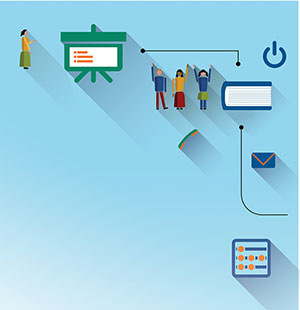
As distance and online education programs proliferate, many seminaries face the challenge of providing adequate library resources to students who live hundreds of miles away. More than half of the members of the Association of Theological Schools (ATS) — 143 out of 277 schools — offer approved distance-education programs, and 26 offer the M.Div. or at least one professional M.A. degree fully online.
While an increasing number of books and journals are available online, they are not free. Theological libraries purchase access to these online resources from the organizations and publishers that provide them.
“In the past, academic libraries collected and owned everything they could,” says Brenda Bailey-Hainer, executive director of the American Theological Library Association (ATLA). “Since the advent of the Internet and the ability to share information online, most libraries now collect only really critical resources and then collaborate with other libraries to share resources.” She emphasizes that board members and top-level administrators need to make sure they provide adequate funding for their library to support their distance- and online-education students.
Established in 1946, the American Theological Library Association is a professional association of more than 800 individuals, institutional members, and affiliates. Almost all ATS-accredited seminaries are members, making use of the many programs and products that ATLA provides.
The Reciprocal Borrowing Program is one resource that ATLA coordinates for more than 80 participating institutions. “These are physical libraries that extend borrowing privileges to other students who walk in the doors,” says Gillian Harrison Cain, member programs director at ATLA. For example, a student in Atlanta may be enrolled in a distance education program offered by a Chicago seminary. If both the student’s seminary in Chicago and another school near the student’s home in Atlanta participate in the Reciprocal Borrowing Program, the student may check out books and other resources from the Atlanta institution just as if he or she were enrolled there. Cain says the program is expanding rapidly, with member libraries encouraging others to participate. “It has grown from a handful to more than 80 member libraries since it started two years ago,” she says. “We get an application every couple of weeks.”
Cain adds: “We also run a library consortia program where member libraries can purchase various products such as databases, software solutions, and e-books. Because we aggregate orders from multiple institutions, we’re able to negotiate discounted pricing with vendors and publishers and pass those savings along to the participating members.”
Two new ventures
Two new cooperative ventures have recently begun at individual theological libraries. The Digital Theological Library was launched last year by Claremont School of Theology (CST) in California, and the Theological Libraries Ebook Lending Project started at Westminster Theological Seminary in Pennsylvania.
1. Digital Theological Library
www.digitaltheologicallibrary.org
The Digital Theological Library was founded by Tom Phillips, dean of the library at Claremont School of Theology. It gives member schools access to an impressive variety of digital books and journals. “We have 14,000 peer-reviewed scholarly books and 67 paid databases in the library right now,” he says. 
Five participating schools share costs as co-owners of the library, which was incorporated as a 501(c)(3) corporation and has been in operation since July 2016. Phillips says that four or five more schools are currently trying it out.
Claremont started the Digital Theological Library in response to the growing number of distance-education students at the school, which is affiliated with the United Methodist Church. About 80 percent of CST students are enrolled in distance-education programs. “When our clientele changed, we realized we had to change the way we thought about the library,” says Phillips.
Traditionally, digital content is licensed to individual schools with pricing structures that begin at 2,000 full-time-equivalent (FTE) students. Consequently, seminaries must either pay for unused capacity or do without digital content. “I was talking to our chief financial officer and trying to figure out a way to make the digital resources financially viable. He said, ‘Let’s form a nonprofit corporation, and let’s license everything to that corporation. That corporation can be
co-owned by a number of seminaries.’” So that’s what they did.
The Claremont board of trustees approved the establishment of the Digital Theological Library in October 2015, and it went online in July 2016. Phillips spent the next six months negotiating with 100 different vendors, setting up the operating and financial structure, and recruiting library partners. He says its current annual budget is about $350,000, which is shared by the co-owning schools. It requires two full-time CST librarians, besides Phillips, to manage the library’s digital infrastructure.
“What we have done is make a high-quality digital library much more affordable for schools that independently could never afford it,” he says. The four other co-owners are Lexington Theological Seminary (in Kentucky), the Athenaeum of Ohio (a Catholic seminary in Cincinnati), Singapore Bible College (in Southeast Asia), and International Baptist Theological Study Center (in the Netherlands). “They have joined pretty much by word of mouth. If someone else is interested in joining, we can give them a test code so their patrons can log on, try it out, and see what they think.”
At this point, CST pays a disproportional share of the cost since the database pricing begins at 2,000 FTE students, and the five schools have a combined enrollment of 600 FTE students. The cost for future participating institutions will depend on their FTE enrollment. “This is our first year of operation. CST is saving money, but we expect to save more money when we get more schools. We are paying for the unused capacity between our 600 and 2,000 FTE, but we would have to pay for that anyway,” says Phillips. “Here’s the beauty of it: It takes the same amount of financial resources, for both content and human resources, to run a high-quality digital library just for Claremont with about 250 FTE as it does to run it for 2,000 FTE students. The Digital Theological Library allows us to spread the cost of maintaining that library over several institutions.”
Phillips welcomes inquiries from librarians who are interested in joining. But he emphasizes that participating schools must first decide whether research is a priority in their academic mission. “There is a big philosophical discussion to have internally within the institution first, and that’s about their mission.” Claremont emphasizes research even for non-residential students. “That means students form original research questions, and then answer those questions in dialogue with the best resources available,” he says.
And that requires robust resources both on campus and online. “I expect us to grow to up to 2,000, and then I would consider re-licensing the FTE limits up to 3,000 students,” says Phillips. “At that point the digital library would have a stable enough income and budget to carry it forward into perpetuity. I don’t expect much trouble getting to that level,” he adds. “The Digital Theological Library’s mission is to give its participating schools greater access to materials at lower cost, and we’re succeeding.”
2. Theological Libraries Ebook Lending Project
www.theologicalebooks.org
The Theological Libraries Ebook Lending Project (TLELP) was also launched in July 2016 by 13 participating seminary libraries after completing a one-year pilot project. While it offers fewer books than the Digital Theological Library, it is also less expensive. “We are a group of independent librarians who decided to work together to share our books with one another’s students,” says Donna R. Campbell, project leader and technical services and systems librarian at Westminster Theological Seminary. The cooperative venture has more than 600 books in its collections from leading publishers such as Crossway, Eerdmans, Fortress, InterVarsity Press, DeGruyter, and Smyth & Helwys. Some librarians are starting to add their school’s dissertations for open-source download.
 Campbell describes TLELP as “a group of independent libraries who are each buying independently, but we are sharing books on a common platform.” They use a software platform from Odilo, a company that organizes and offers digital content for businesses and nonprofits. “It’s like saying we share a building, but we buy our own collections,” Campbell explains.
Campbell describes TLELP as “a group of independent libraries who are each buying independently, but we are sharing books on a common platform.” They use a software platform from Odilo, a company that organizes and offers digital content for businesses and nonprofits. “It’s like saying we share a building, but we buy our own collections,” Campbell explains.
The project has licensing agreements with publishers that allow participating libraries to purchase their own books and then upload and share them. While most publishers only allow one simultaneous checkout for each copy, two publishers allow unlimited concurrent checkouts for students at the purchasing library.
TLELP doesn’t have a central staff, so it is operated by volunteers from participating schools. Besides Campbell at Westminster, they include Benjamin Boss, acquisitions and cataloging leader at Western Theological Seminary; Garrett Trott, publisher liaison at Corban University; and Steve Jamieson, user experience leader at Covenant Theological Seminary.
The cost of participation varies by FTE enrollment and length of commitment. For example, a seminary with 200 FTE students and a two-year commitment pays about $1,760 per year. Publishers typically provide a 10- to 40-percent discount off list prices. Participating seminary libraries include Corban University, Grace College and Seminary, Harding School of Theology, Lutheran Theological Seminary at Gettysburg, Lutheran Theological Seminary at Philadelphia, Multnomah University, Payne Theological Seminary, St. Charles Borromeo Seminary, St. John Vianney Theological Seminary, St. Tikhon’s Orthodox Theological Seminary, Virginia Theological Seminary, Western Seminary, Western Theological Seminary, and Westminster itself.
Campbell stresses some of the advantages of TLELP. “Libraries have the ability to buy e-books on a title-by-title basis rather than huge packages. They can buy books according to their collection policies so that each title supports their curricula.
Finally, they have a centralized place for their e-books so patrons have only one place to log in,” she says.
Essential collaboration
Providing access to an adequate number of books and journals for non-residential students is becoming both an educational necessity and a survival tool as many seminaries see an increasing number of distance education students and fewer residential students. These collaborative efforts from the American Theological Library Association, the Digital Theological Library, and Theological Libraries Ebook Lending Project are moving to fulfill that need.
Melinda Thompson is assistant professor and director of distance education for the Graduate School of Theology at Abilene Christian University. She says: “This is the digital age. E-books and online journals are just as accessible to residential students as to online students, not to mention faculty members who don’t have time to comb through the archives when they’re up against a publishing deadline. Why wouldn’t schools work together to make these resources more broadly available?” Indeed, they already are.
More information
Gillian Harrison Cain
Director of Member Services
American Theological Library Association
gcain@atla.com
Thomas Phillips
Dean of Library and Information Services
Claremont School of Theology
tphillips@cst.edu
Donna R. Campbell
Technical Services and Systems Librarian
Westminster Theological Seminary
dcampbell@wts.edu